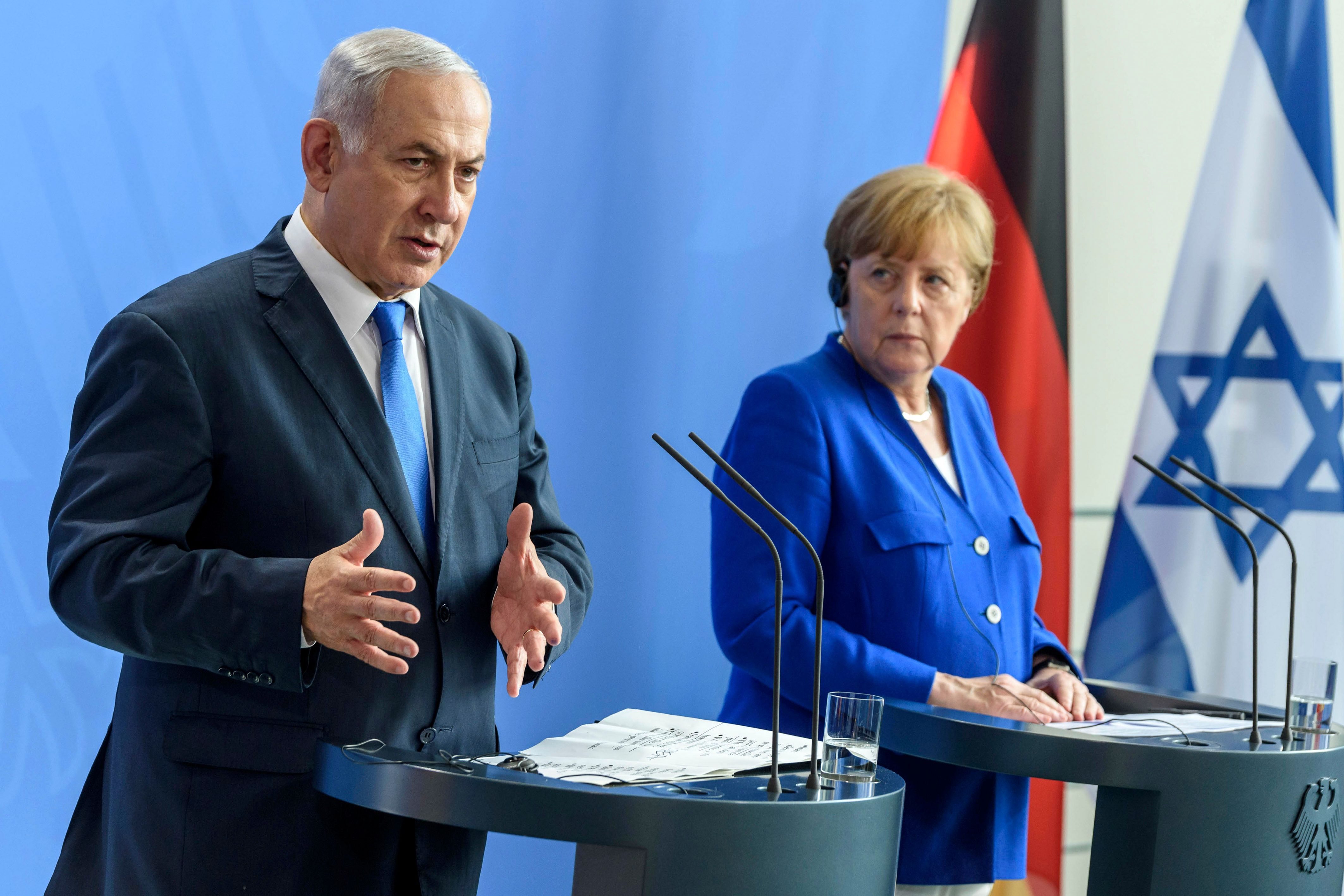A Revision of Special Relations? Israel in German Foreign Policy

The plans of the government of Benjamin Netanyahu to incorporate settlements in the West Bank have been slowed down by the declaration of normalisation of diplomatic relations with the UAE, initiated jointly with the United States. At the same time, the Israeli authorities stressed that they would not give up on annexation, which remains likely in 2020 due to the presidential election in the United States. Although the Trump Administration refuses to approve the annexation, the president may change his position if he fails to be re-elected, in order to show support for Israel before the Democrats take power.
The moment of incorporation of the settlements would then coincide with the German presidency of the EU Council and non-permanent membership of the UN Security Council, which would pose a serious challenge to Germany’s foreign policy. The annexation would undermine Germany’s main goal towards the Middle East, which is to ensure the stability of the region, and its refusal to agree to the policy of fait accompli, thus weakening the order based on international law. Additionally, the incorporation of the settlements would complicate transatlantic relations as well as Germany’s bilateral relations with the United States, as there are differences in Middle East policy.
The Specificity of Relations between Israel and Germany
Israel’s special status in Germany’s foreign policy was determined by the latter accepting responsibility for the crimes of the Holocaust. As a result, Germany’s post-war priority towards the Middle East has been to ensure Israel’s security and right to existence. In the coalition agreement of the CDU/CSU-SPD government of March 2018, this goal was defined as “the unwavering pillar of German policy”. Its implementation is to be helped by the support that Germany provides to Israel, among other ways in international forums. In May 2019, during Germany’s term as a non-permanent member of the UN Security Council, Foreign Minister Heiko Maas assured that Germany would oppose any attempts to isolate or delegitimise Israel. German support also extends to the EU forum, where Germany has been one of the main opponents of retaliation for the actions of the Israeli authorities in the Palestinian territories. Intensive political dialogue between Germany and Israel is maintained by intergovernment consultations, which have been held every two years since 2008. Both countries also have strong economic contacts: in 2019, Germany was Israel’s third largest trading partner (the value of trade was $7.1 billion), and German companies are at the forefront among Israel’s most important foreign investors. Germany is the second largest supplier of arms to Israel, responsible for 16% of imports for the Israeli army (SIPRI data) from 2015 to 2019. An important element of cooperation is also scientific collaboration in areas such as nanotechnology and development aid (for example, in sub-Saharan Africa).
The deadlock in the Israeli-Palestinian peace process following the failure of the talks in 2013 and 2014 began to make it difficult for German diplomacy to hold back criticism against Israel. This is due to the German stance on the conflict, consistent with the rest of the EU, which envisages the development of a two-state solution in direct negotiations between both sides. Hence, the intensive dialogue with Israel is accompanied by support for the Palestinian territories, including humanitarian aid and educational programmes. In 2018, the German government provided over €179 million to development programmes in the Palestinian Authority (PA). Germany is also the largest donor of funds to aid Palestinian refugees: in 2019, it pledged to donate $169 million to UNRWA.
At the same time, Angela Merkel’s government criticised Israel’s violations of Palestinian rights and the expansion of settlements in the West Bank. Germany was also critical of the legal changes implemented by the Netanyahu government, including an act regulating the activities of non-governmental organisations and a new constitutional act limiting the existing rights of the Arab population in Israel. An additional element complicating Germany’s relations with Israel is the divergence of views on the U.S. denouncing the 2015 nuclear agreement with Iran, which was opposed by Germany.
Germany’s Potential Response to Annexation
In view of the increased probability of annexation, Germany has recently undertaken a series of actions beneficial from Israel's perspective in order to strengthen its position in the political dialogue about the West Bank with the Netanyahu government. In May 2019, the Bundestag condemned the international pro-Palestinian movement Boycott, Divestment, Sanctions (BDS), whose strategy (including pursuing economic boycott) was described as anti-Semitic. In February, Germany (together with Hungary and Czechia) raised objections regarding International Criminal Court (ICC) plans to initiate proceedings over Israel's actions in the occupied Palestinian territories. Germany expressed the opinion that the ICC cannot proceed in the case of Palestine as it is not a state and as such could not become a party to the Rome Statute. In April, Interior Minister Horst Seehofer announced a ban on Hezbollah’s activities in Germany, thus extending the restrictions covering only its military wing, which since 2013 has been on the EU list of terrorist groups. These actions, concerning issues considered by Israel to be strategic threats, were well received by the Netanyahu government. Additionally, German diplomacy is involved in negotiations between the Israeli authorities and Hamas on the exchange of prisoners.
Since the announcement of the Trump peace plan and the formation of the Likud and Blue-White government. Germany has emphasised its disagreement with the annexation of Jewish settlements announced by the Israeli authorities. The objections was expressed in a joint statement with the PA government in May and a four-party declaration with France, Jordan and Egypt in July. The latter stressed that any unilateral change of the 1967 borders (in which a Palestinian state is to be established) would not be recognised. The future of the West Bank was subject of Mass's visit to Israel and Jordan in June. According to media reports, he assured that Germany would not join any sanctions from the EU in the event of the incorporation of the settlements. A similar message was voiced in the Bundestag resolution in July. It called on Israel to halt the annexation of settlements due to its incompatibility with international law, but stressed that any imposition of sanctions would be counterproductive.
Conclusions
Germany tried to halt Israel’s unilateral moves over the Palestinian territories by direct diplomatic means. This was indicated by the readiness of the German government to make adjustments in its foreign policy at the expense of, for example, relations with Lebanon after the ban on Hezbollah, and with the Palestinians after the decision on the ICC. It was a signal that Germany, while it is taking into account Israel's interests, could change its position in the event of annexation. Germany will also support the UAE-initiated process of normalising Israel’s relations with the Gulf States as an effective way to stop plans to incorporate the settlements. However, Netanyahu’s declarations indict that annexation is still possible. In this scenario, it may not be possible for Germany to maintain the special format of relations. The change in Germany's approach is most likely to be visible primarily in the context of European policy towards Israel.
EU countermeasures in the event of annexation against Israel remains unlikely due to the lack of unanimity among Member States, which has so far made it impossible to reach a common position on this matter.
Some Member States (such as France and Luxembourg) may therefore decide to create a retaliation mechanism beyond the EU level. For historical reasons, Germany will not join such activities, but neither will it act to prevent them. Germany's passivity will be such a clear signal of a change in its approach to Israel that it may contribute to tightening the positions of other EU countries. This increases the likelihood that more would join a possible retaliation mechanism. The Israeli government will have to take into account in its political calculations for the West Bank, the increased pressure, and loss of support from its most important European ally.



